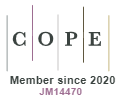Relationship between renal transplantation time and respiratory muscle strength: case series
DOI:
https://doi.org/10.5585/conssaude.v18n1.8714Keywords:
Renal transplantation. Respiratory Muscles. Spirometry. Physical activity.Abstract
Downloads
References
Kalender B, Erk M, Pekpak MA, Apaydin S, Ataman R, Serdengeçti K, et al. The effect of renal transplantation on pulmonary function. Nephron. 2002; 90(1): 72-77.
Rocha ER, Magalhaes SM, de Lima VP. Repercussion of physiotherapy intradialytic protocol for respiratory muscle function, grip strength and quality of life of patients with chronic renal diseases. J Bras Nefrol 2010; 32: 355–366.
Kovelis D, Pitta F, Probst VS, Peres CPA, Delfino VDA, Mocelin AJ et al. Função pulmonar e força muscular respiratória em pacientes com doença renal crônica submetidos à hemodiálise. J. Bras. Pneumol. 2008 Nov; 34(11): 907-912.
Ewert R, Opitz C, Wensel R, Dandel M, Mutze S, Reinke P: Abnormalities of pulmonary diffusion capacity in long-term survivors after kidney transplantation. Chest 2002; 122:639-644.
Lung function testing: selection of reference values and interpretative strategies. American Thoracic Society. Am Rev Respir Dis. 1991;144(5):1202–1218.
Pereira CAC, Sato T, Rodrigues SC. Novos valores de referência para espirometria forçada em brasileiros adultos de raça branca. J. Bras. Pneumol. 2007; 33(4): 397-406.
American Thoracic Society/European Respiratory Society ATS/ERS. Statement on respiratory muscle testing. Am J Respir Crit Care Med 2002; 166: 518-624.
Neder JA, Andreoni S, Lerario MC, Nery LE. Reference values for lung function tests. II. Maximal respiratory pressures and voluntary ventilation. Braz J Med Biol Res. 1999; 32(6): 719-727.
Caruso P, Albuquerque LP, Santana PV, Cardenas LZ, Ferreira JG, Prina E. Métodos diagnósticos para avaliação da força muscular inspiratória e expiratória. J Bras Pneumol, 2015; 41(2): 110-23.
Matsudo S, Araújo T, Matsudo V, Andrade D, Andrade E, Oliveira C, et al. Questionário Internacional de Atividade Física (IPAQ): estudo de validade e reprodutibilidade no Brasil. Rev Bras Ativ Fís Saúde. 2001; 6(2): 5-12.
Neto PML, Lima EVNCL. Avaliação da função pulmonar e qualidade de vida de pacientes renais crônicos em fase de pré-transplante renal. Rev Pesq Saúde. 2013; 14(3): 141-144.
Jatobá JPC, Amaro WF, Andrade APA, Cardoso FPF, Monteiro AMH, Oliveira MAM. Avaliação da função pulmonar, força muscular respiratória e teste de caminhada de seis minutos em pacientes portadores de doença renal crônica em hemodiálise. J Bras Nefrol 2008; 30:280-7.
Cury JL, Brunetto AF, Aydos RD: Efeitos negativos da insuficiência renal crônica sobre a função pulmonar e a capacidade funcional. Rev Bras Fisioter. 2010; 14 (2): 91-98.
Guleria S, Agarwal RK, Guleria R, Bhowmik D, Agarwal SK, Tiwari SC. The effect of renal transplantation on pulmonary function and respiratory muscle strength in patients with end-stage renal disease. Transplant Proc. 2005; 37(2): 664-5.
Tavana S, Mirzaei S. The effect of renal transplantation on respiratory muscle strength in patients with end stage renal disease. Tanaffos. 2016; 15(2): 83-8.
Di Naso FC, Pereira JS, Schuh SJ, Unis G. Avaliação funcional em pacientes com sequela pulmonar de tuberculose. Rev Port Pneumol 2011; 17:216-21.
Chushkin MI, Ots ON. Comprometimento da função pulmonar após tratamento para tuberculose: o resultado final da doença? J. Bras. Pneumol. 2017; 43(1): 38-43.
Reboredo MM, Henrique DMN, Faria RS, Bergamini BC, Paula MGBeRB. Correlation between the distance covered in the six-minute walk test with peak oxygen uptake in end-stage renal disease patients on hemodialysis. Braz. J. Nephrol. (J. Bras. Nefrol.) 2007; 29(2): 85-89.
Ainsworth BE. How do I measure physical activity in my patients? Questionnaires and objective methods. British Journal of Sports Medicine 2009; 43:6-9.
Galanti G, Stefani L, Mascherini G, Petri C, Corsani I, Francini L et al. Short-term prospective study of prescribed physical activity in kidney transplant recipients. Intern Emerg Med 2016; 11: 61-67.
Downloads
Published
How to Cite
Issue
Section
License
Copyright (c) 2019 ConScientiae Saúde

This work is licensed under a Creative Commons Attribution-NonCommercial-ShareAlike 4.0 International License.
- Abstract 487
- PDF (Português (Brasil)) 462






